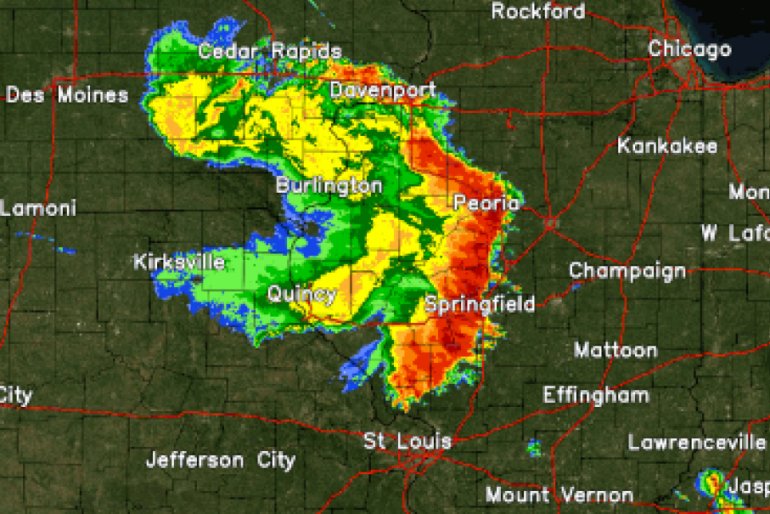The pre-Independence Day derecho on June 29th proved one of the largest, most destructive storms to hit Illinois in recent memory. The fast-moving storm with straight-line winds in excess of 110mph in places caused massive power outages and extensive property damage.

It also gave many of us a real-world opportunity to test our emergency skills and preparations. For those who lacked skills and preps, it offered a wake-up call for them to better prepare for unexpected emergencies. Now, whether or not they hit the snooze button is another matter.
We didn’t lose power at my place in the immediate aftermath of the storm. Elsewhere, about 200,000 homes and businesses did lose electricity. We didn’t escape unscathed though. I lost the upper half of our biggest backyard tree.
I waited for the torrential rains and winds to die down before going out to assess the damage. Then, back inside, I texted some friends asking for a bit of help.
Several were already out helping neighbors or immediate family. I shouldn’t have been surprised as that’s just the nature of people that GSL attracts into its orbit. A couple of others were out of town, including one at a conference in Indianapolis camped out in a (hot) hotel room without electricity. I bet that was sweet. Hope he brought his swim trunks.
Later, with the help of friend Chad from the Bloomington-Normal area, we made most of the fallen part of the tree go away Thursday evening, thanks in large part to my friend Mr. Stihl and Chad’s buddy Mr. Husqvarna.

Some important lessons were affirmed by the experience.
1. Good friends are priceless and will come when you need them. Of course, you have to reciprocate.
2. When it comes to equipment, tools like generators and chainsaws are a must-have for storms. Fuel, too. Gasoline represents freedom and independence. Freedom to travel and freedom to power tools necessary for clean up. Not to mention fuel to make electricity to keep your foods cold, your basement dry and for other essential tasks.

3. Don’t overlook safety gear. Chainsaw chaps, for instance, provide cheap insurance against serious, potentially crippling injury when you’re tired, wet and uncomfortable. Ditto for a bump cap or helmet. Falling objects are a thing in the aftermath of storms.

4. Speaking of safety gear, you’ll need more than one pair of leather work gloves to protect your precious hands. Wet gloves lose much of their protective properties PDQ. There’s a reason they sell leather work gloves in 6-packs. Buy a package of jersey gloves and use them as liners for a comfy fit in the summer and comfy plus warm in the winter.

5. Don’t get dehydrated. Drink plenty of water. The first thing to go when you get dehydrated is your ability to concentrate. If you’re using a chainsaw, generator or heavy equipment, a loss of concentration can turn crippling (or shocking) in an instant.
6. Even with a half-gallon of kerosene to coax things along, fresh cut cypress and pine wood doesn’t burn well at all – even after being “seasoned” for a day or two. (Laugh out loud.)
7. Kiddos (pre-teens at least) often love to help. Get them appropriate sized work gloves (procured ahead of an emergency) and give them a task that’s safe to keep them occupied. Don’t forget the reward for following through (I failed there…) Otherwise they might bring a full-size axe out of the shed and want to help (he did).

8. If you’re doing storm cleanup after dark, light is your friend. The new LED portable worklights are a little pricey compared to the old quartz halogen lights of yesteryear, but they sip electricity and are more durable. That’s very helpful if you’re using a generator and don’t want to run out of gas before you run out of emergency.
9. Have the basics for emergency cleanup (like tarps, for instance) at home ahead of a storm, along with supplies to support your equipment like saws and generators. You may not be able to get to your local Lowe’s or Home Depot – or they might not be open if they too are without electricity.
10. For those without generators, make sure you have a means to keep your phone charged! Your cellphone is your lifeline.

On the generator side of things.
Keep extra oil on hand of the appropriate weight. My generator uses 10W30 in warm weather and 5W30 in freezing temps. Be prepared to change the oil every 3 days of continuous use. A spare sparkplug with a gap tool will serve you well in the event of a fouled plug at 3AM. We often talk about spare gas, it doesn’t have a long shelf life. If you use a fuel stabilizing product you can of course keep gas longer. Create a plan to rotate your fuel. My stabilizing product claims it is good for two years. I make sure it doesn’t stay around for more than 1 year. Dated stickers on the cans help keep me in check. I put 5 gallons in the truck every couple of months at fillup time. Putting fresh gas in the can. Obviously you wouldn’t store this in the basement.